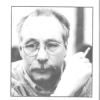W. G. Sebald

W. G. Sebald
Winfried Georg Sebald— known as W.G. Sebald or Max Sebald — was a German writer and academic. At the time of his death at the age of 57, he was being cited by many literary critics as one of the greatest living authors and had been tipped as a possible future winner of the Nobel Prize in Literature. In a 2007 interview, Horace Engdahl, former secretary of the Swedish Academy, mentioned Sebald, Ryszard Kapuściński and Jacques Derrida as three recently...
NationalityGerman
ProfessionWriter
Date of Birth18 May 1944
CountryGermany
At the most we gaze at it in wonder, a kind of wonder which in itself is a form of dawning horror, for somehow we know by instinct that outsize buildings cast the shadow of their own destruction before them, and are designed from the first with an eye to their later existence as ruins.
I feel more and more as if time did not exist at all... only various spaces interlocking according to the rules of a higher form of stereometry[the geometric measurement of solid bodies], between which the living and the dead can move back and forth as they like, and the longer I think about it the more it seems to me that we who are still alive are unreal in the eyes of the dead.
Otherwise, all I remember of the denizens of the Nocturama is that several of them had strikingly large eyes, and the fixed inquiring gaze found in certain painters and philosophers who seek to penetrate the darkness which surrounds us purely by means of looking and thinking.
At the time I could no more believe my eyes than I can now trust my memory.
Until I was 16 or 17, I had heard practically nothing about the history that preceded 1945. Only when we were 17 were we confronted with a documentary film of the opening of the Belsen camp.
I was brought up largely by my grandfather because my father only returned from a prisoner-of-war camp in 1947 and worked in the nearest small town, so I hardly ever saw him.
Occasionally I write a small piece or the odd lecture in English, and I teach in English, but my fiction is always written in German.
A subject which at first glance seems quite removed from the undeclared concern of the book can encapsulate that concern.
You could grow up in Germany in the postwar years without ever meeting a Jewish person. There were small communities in Frankfurt or Berlin, but in a provincial town in south Germany, Jewish people didn't exist.
I don't want to talk about my trials and tribulations. Once you reveal even part of what your real problems might be in life, they come back in a deformed way.
In school I was in the dark room all the time, and I've always collected stray photographs; there's a great deal of memory in them.
I always read the translator's draft all the way through - a very laborious business.
Comparing oneself with one's fellow writers is a bad idea. I would not review a fellow writer unless I had something terribly positive to say.
Places seem to me to have some kind of memory, in that they activate memory in those who look at them.